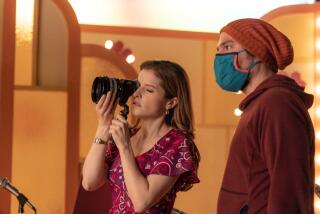MOVIE REVIEW : ‘Nikita’: A Thriller With a Feminine Twist
- Share via
In Luc Besson’s “La Femme Nikita,” the title character (Anne Parillaud) looks like a fashion model who’s stumbled into heroin addiction. A punk junkie hanger-on with morose eyes, spiky hair and lean, coltish limbs, she seems to inhabit a dead zone, gray, somnolent, from which she occasionally bursts out in zaps of profanity and violence.
The key to her appeal, perhaps, is that she doesn’t belong. She doesn’t look poor or sociopathic, but she dresses poor and kills cops. Her chic gleams through the dead-eyed grime. That makes her a fittingly mixed image for this movie, the biggest French-made French box-office hit of 1990, a film that tries to mix grit and sleekness, death and love, action and amour. (It’s at the Westside Pavilion and Beverly Center Cineplex.)
It’s an imitation American high-tech urban thriller that follows the rules but subverts them, trying to twist this usually all-male genre into a feminist fable. Like the movies its modeled after, it’s shallow, frequently silly. But there’s something about the mix--maybe something about Parillaud as the screechy, dangerous Nikita--that may make the movie a powerful engine of wish-fulfillment.
In the beginning, the picture works hard to present Nikita as startlingly violent, a rebel whose only cause is pain and addiction. At the bottom, there are her junkie mates, killing and robbing without conscience. At the top, there’s the secret French government and its intelligence agency, killing and robbing with even less.
Shuttling between the two worlds, Nikita is turned from free-lance murderess into a pro. The agency claims her, tames her. She even gets lessons in femininity from Jeanne Moreau as a courtesan-tutor; Moreau’s lessons are like rock-video reductions of Collette’s advice in “Gigi.” And, quickly, Nikita falls in love with two men: the icy Svengali who makes her a hit-woman (Tcheky Karyo’s Bob) and the gentle, sad-eyed soul who cooks ravioli for her (Jean-Hugues Anglade as Marco). That’s the opposition: Mars vs. Eros, in a world of metal and fluorescent paranoia.
Besson’s last movie, “The Big Blue,” was a gloopy Jerry Weintraub co-production, complete with sunlit oceans, scampering dolphins and an inspirational deep-diving contest. With “Nikita,” he ‘s going back to the pared-down structure and near-mechanical stylization of his first two movies, “Le Dernier Combat” (made when he was 23) and “Subway.” He’s also trying to show that love can triumph over death, tenderness over slaughter.
Yet his images here have the sterile, spattered quality of an aluminum wall with Day-Glo graffiti, and his violence explodes in stylized bursts, just like the usual high-tech Hollywood thriller. In fact, Besson may be the nearest French equivalent to the post-’70s “movie brats.” He’s no thinker and he’s weak with character, he tends to ridicule or ignore literature, yet he works powerfully with the raw elements of movie-making.
He’s weakest as a writer of a dialogue, most self-confident in the scenes that have little or none--or a whole movie that has none, like “Le Dernier Combat.” Besson’s cast here is quite good; Parillaud, Karyo and Anglade are all charismatic actors who can suggest levels of meaning beneath their spare lines. But their characters tend to exist only in visual terms, emanations of the storyboard.
In “La Femme Nikita,” there’s only one performance that really fits the style: Jean Reno as Victor, the “Cleaner,” a “Terminator”-style agent who sweeps in on busted missions. Victor, moving ahead remorselessly and mowing down everything in his path, makes the movie’s ultimate comment on the fakery and emptiness of machismo. And Reno, a Besson regular--he also appeared in “Combat” and “The Big Blue”-- plays him like a slightly puzzled, nearsighted robot.
“La Femme Nikita” (rated R for sex, language and violence) is shallow, glitzy, ultra-violent. Ironically, it may be the kind of foreign-language film that’s tailor-made for people who want art and subtitles--the chic of it, the cachet--without the alleged pain or suffering of too many ideas or somber emotions. This is not French filmmaking at its best; it’s a copy of American studio work, with a few bent wisps of feeling drifting in. Yet good mechanics can make half-good machines, and that’s what Besson has done here. He hasn’t trapped the soul inside, the thing he really wants. But he keeps his vehicle crashing prettily against the walls.
‘LA FEMME NIKITA’
Anne Parillaud: Nikita
Jean-Hugues Anglade: Marco
Tcheky Karyo: Bob
Jeanne Moreau: Amande
A Samuel Goldwyn Co. release of a Gaumont production. Director/screenplay Luc Besson. Cinematographer Thierry Arbogast. Editor Olivier Mauffory. Costumes Anne Angelini. Music Eric Serra. Production design Dan Weil. Sound Pierre Befve, Gerard Lamps. With Jean Reno. Running time: 1 hour, 57 minutes.
MPAA-rated R (violence, sex, language).
More to Read
Only good movies
Get the Indie Focus newsletter, Mark Olsen's weekly guide to the world of cinema.
You may occasionally receive promotional content from the Los Angeles Times.










